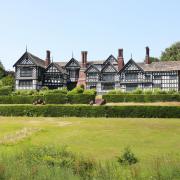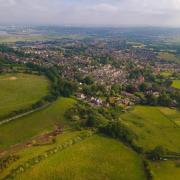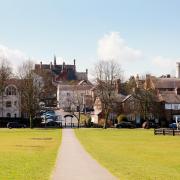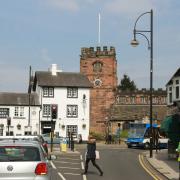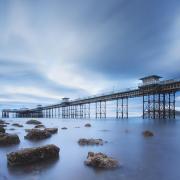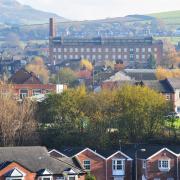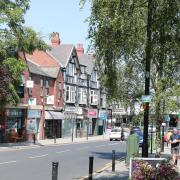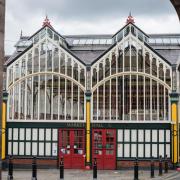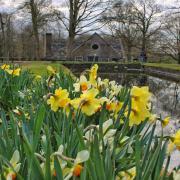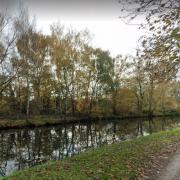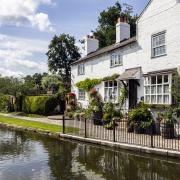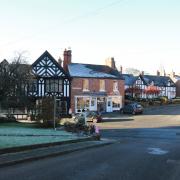Art, comedy, festivals and more...Congleton makes the most of its great location and community spirit, writes Janet Reeder

They sold their church Bible to pay for a bear but hey guys... that’s entertainment!
As the legend goes, in the 1600s Congleton’s townsfolk were so desperate when their lucrative dancing bear died that they flogged off their Bible to pay for a new one.
A less sensational version of the tale is told by local historians keen to point out that it was actually money set aside for a new Bible that was used in this transaction but why let the facts get in the way of a great story? One that earned Congleton the nickname Beartown.
What seems to be a constant is the desire to entertain, which lives on to this day. Whether it is comedy, opera or a food festival, Congleton packs a lot into its annual programme of events.

The town is proud of its independent Daneside Theatre which was set up over 30 years ago to accommodate the local Congleton Theatre Group and has since gone on to house various theatrical and musical societies, who ensure its 300-seater auditorium is filled every month of the year.
Paul Drage, who helped establish the theatre in 1980 explains that at the time Congleton was awash with groups putting on shows.
‘ Congleton has always had quite a lot of different organisations putting on shows,’ he explains.
‘ Congleton Players were using an old mill building which got knocked down and because they were losing their home they started off the idea of all the societies getting together.

‘Now the theatre is run by a trust which is totally independent but made up of the societies who use it. We are essentially a community-run building that is self funding.’
It all happens at the Daneside which is a hub for theatre, regular film nights as well as various ad hoc events.
‘I don’t know of any other building anywhere that has the same way of working,’ admits Paul.
‘ There are quite a few places where the building is owned by a particular society where they might do four or five shows a year but they are only used by one society whereas we have I think about six societies who use the building.’
Not content to rest on its laurels the Daneside has launched a fundraising bid that will extend its foyer on both levels - but as Paul says they won’t be selling any Bibles this time around.
‘We are just not big enough so we are looking at putting a 10-12ft extension to the front of the building on both levels just to open everything out,’ he explains .
‘This means we are looking at a fairly big chunk of money and because of the way all the funding systems work you have to get to a particular point of the planning before you can go out looking for the cash - which is about a quarter of a million pounds. It’s pretty massive.
‘The options are there for funding, but because we are run by volunteers it will take us a bit of time. We will get there shortly, I’m sure.’
Congleton is also the home of the famous Clonter Theatre which is renowned for putting on high quality opera and has been a breeding ground for singers such as Alfie Boe and baritone Simon Keenlyside. Recently it has extended its repertoire to include folk, jazz, musicals and youth performances.
Its history stretches back to the 1970s when Jeffrey Lockett and his wife, Anita, gave a charity operatic picnic at their home, Clonter Farm. For eight years more operatic picnics followed at their barn location. They used hay bales as tiered seating and ran the box office literally from a box (a shoe box) in their kitchen.
It thrived with patronage from opera fans such as Viola Grosvenor, Duchess of Westminster, Sir Charles Groves and latterly Sir George Christie from 1998-2014. Early supporters included the music critic Michael Kennedy CBE who championed Clonter for many years and strong links were formed with teachers and emerging artists from the Royal Northern College of Music in Manchester. By 1983 Clonter’s operatic picnics had become firmly established and there was a demand for more performances. Jeffrey set about converting the barn into a permanent theatre, which in its latter day incarnation comprised a 400 seat auditorium, with undercover dining facilities and a licensed bar, stage and orchestra pit.
Now it enters another stage of its development as Joint Chief Executive Isabella Lockett explains: ‘We’ve rebranded just as Clonter. We have all the excellent productions as part of our operatic heritage but people say ‘It’s not my bag. I’m not going’ and didn’t realise we did other things. Around half the programme is non-opera now and our new audience has increased by 30 per cent.
‘It means 30 per cent of people who visited last year had never been here before, so we are pleased about that.
‘We want to get people to try out lots of different things, from Eddi Reader, who played recently in a collaboration with Foden’s brass band who we have at our Christmas concert.
‘There’s a lot of competition around now that was something we didn’t have 43 years ago when we were set up. We didn’t have Buxton Opera House, The Bridgewater Hall, the Lowry but it’s very healthy having all this competition. It keeps us on our toes, which is good.’
Rob Riley set up the Congleton Comedy Club at the Vale Club precisely because there was no competition.
‘Congleton is good choice because it is a reasonably affluent area and there was basically not a lot going on on a Friday night,’ he reveals.
‘There was a bit of a live music scene and you had the opera at Clonter but nobody was doing quality comedy. There was just us basically.’
He originally set up the night at the White Swan Pub around 2008.
‘A friend of mine did a charity gig at the White Swan and said “this is brilliant we’d like a regular night!” We went down and did the first show for the guy who owned the pub called John, who was a lovely, fellow, then ended up running them for about six months. They were going really well and then sadly John became ill and within about six weeks he died. His family very quickly sold the pub.’
The nights didn’t last when the new owner took over for a number of reasons but last year another Venue, the Vale Club decided to revive the popular events and Rob says they are going really well.
‘The thing we’ve noticed over the last couple of years, since people’s belts have tightened, that at the moment in the licensed trade if you want to get people in you need to give them something extra. ‘
People aren’t nipping into the pub on a Friday night any more just for the sake of it. They want to do something - either go for a meal or see a show and if you offer them something that’s quality and value they will come out.’
‘We’ll probably do this every other month for the rest of the year. Since we moved we’ve had a lot more interest so hopefully we will go back to monthly assuming the numbers keep up.’
As well as comedy and theatre Congleton has a wide range of other activities to enjoy. Jo Money runs Congleton Community Projects at the Electric Picture House Artists Collective, a group which is responsible for the Congleton Food Festival which will be held this year on June 11th.
She explains that it was set up at a time when Jamie Oliver was raising awareness about school meals and nutrition.
‘There were a lot of farmers’ markets around here but accessibility was the big issue so we thought that if we brought them all into the town centre and made a fun, free festival, then everyone could access good quality local food,’ she says.
‘In the first year we had about 40 stalls it built up from there and we now have over a hundred.’
As well as stalls, visitors to the festival can expect a menu of demonstrations in the Town Hall, called What’s Cooking provided by South Cheshire College and Eaton Bank Academy together with local restaurants. The Young Chef of the Year Award final is also a highlight of the event. ‘It’s organised by Congleton Community Projects which is a not for profit organisation,’ says Jo.
‘We also do theatre and arts events, workshops, the Christmas lights switch-on. There’s a big volunteering event in the park and we also produce a volunteers directory. A lot of it is about bringing people into the town itself.
‘There is definitely a strong arts thing here. We have some very interesting businesses that have opened such as Gather, which does all sorts of craft workshops. There’s an art gallery called Attitude and lots of arts groups and writers groups. Yes, Congleton is a very interesting place.’
Book now...
Congleton-based Visyon charity which was set up offer support to youngsters facing mental and emotional problems is holding its race night networking event on June 24th and June 25th.
Billed as ‘a wonderful evening of old school fun and light competition between local business rivals’ guests can watch the races on the big screen and place their bets. Alongside the action of the races, enjoy a hot fork buffet and live music with the Red Rums of Cheshire’s business network. All profits go to supporting the children’s mental health charity that has been serving Cheshire and North Staffordshire for 23 years.
Wychwood Park Golf Club Wychwood Park Weston
www.visyon.org.uk
Congleton Comedy Club
June 30th’s line up includes Tom Deacon, Gavin Webster and compère Hayley Ellis appearing at Val Club, Canal Street at 8.30pm
www.congletoncomedy.co.uk




